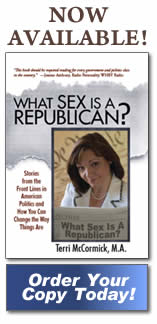DIRTY TRICKS AND ELECTION ENGINEERING
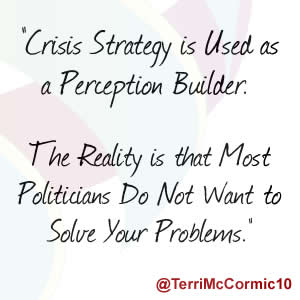 The tactics outlined below reveal a few strategies used in old-style political campaigning. It is hoped that you will take these as examples of politics at its worst and either become a voice for change or a more informed voter.
The tactics outlined below reveal a few strategies used in old-style political campaigning. It is hoped that you will take these as examples of politics at its worst and either become a voice for change or a more informed voter.
Perception is reality in the political arena. In fact, politics pulls directly from the strategies of marketing and intellectual warfare in equal proportions.
If human beings were as easily manipulated as some in politics would like to believe, all it would take for a candidate to win would be to touch voters four times!
That would include a hand shake, a card in the mail, a radio ad and a knock on the door by a volunteer. If that is indeed the case, we as voters must be aware of the forms of political messages so that we may better discern fact from fiction.
TACTIC NO. 1: CREATE AN ILLUSION OF THE PERFECT CANDIDATE
The perfect family, perfect spouse and neighbors are all a first step in creating the right image on political campaign literature. Your first campaign piece is a bio piece that shows off your family and your personal and professional accomplishments.
However, politics is like a Hollywood movie set—some sets are barren, with only a few pictures scattered on the wall. Others have the depth and breadth of the horses, the ranch, and the farmhouse, complete with family and livestock.
It is up to the voter to determine if the candidate lives where he says he lives, has the background he is claiming and has actually served as the church bell choir director back home. If we don’t do our homework to expose imposters before they rise to power, shame on us.
TACTIC NO. 2: STRAW MAN POLITICS (SHOW ME WHO TO BLAME SO THAT I KNOW WHO NOT TO VOTE FOR!)
Straw man politics is the most commonly used tactic in political campaigns. If you need someone to hate and someone to blame in order to rally your base, straw man politics is the strategy to use. This tactic, like all political diversions, is intended to keep voters’ eyes off the ball.
The last thing a candidate wants is for the voters to realize that his/her opponent is better qualified and has better ideas on the issues at hand. Instead, straw man politics is intended to be used as a tool to demonize your opponent.
TACTIC NO. 3: CREATE A CRISIS (WITHOUT A CRISIS, WE CAN’T MOTIVATE THE VOTERS!)
Most famous is the phrase “Wag the dog,” made popular in Joe Klein’s Primary Colors. This is a classic fear-mongering strategy that paints a scenario of an inevitable war or national crisis. This create-acrisis tactic is used to motivate voters by telling them the other guy will make it worse. It uses the emotion of fear to conjure up an unknown threat or enemy.
The thought behind this strategy is to make people fearful so one candidate can be seen as the “only” person who can solve the crisis. The Hillary Clinton ad, “Who would you want to answer the telephone at 3:00 in the morning in the White House?” is a prime example. Obviously, you would want the heroine of the movie to answer the phone because she has the experience.
This crisis strategy is used as a perception builder. The reality is that most politicians do not want to solve your problems. Think about it: if all problems were solved, there would be no need to hire campaign fund-raisers, pay graphic artists, print literature, pay political pollsters, hire opposition researchers or orchestrate elaborate political machines.
Without problems, how would we excite and disturb the base of our respective political parties? Republicans must have big spenders and anti-gun people to vote against—or else. Democrats must have war-mongering fat cats that want to exploit everyday citizens—or else.
TACTIC NO. 4: PERSONAL SMEAR CAMPAIGN (EFFECTIVE WHEN USED IN ESTABLISHED NETWORKS)
This campaign strategy is most effective against a member of your own political party. The proverbial whisper campaign is subtle, effective and difficult to trace. It hinges on the claim that one knows his/her party competition best and the competition is flawed. Be wary of political parties and other such clubs that demand blind obedience to the party line. As proverbial sheep to the slaughter, so, too, are those who do not think for themselves, particularly when asked to follow blindly against one of their own.
John McCain was the victim of a malicious smear campaign in his presidential primary bid in 2000. How do we know? George W. Bush’s communication director came clean on this topic in a recently published book. On page 149 of Joe Klein’s book Politics Lost, Mark McKinnon, then communications director for George W. Bush, was quoted shortly after Bush’s defeat in New Hampshire at the hands of John McCain:
“What followed, in South Carolina, was one of the most disgraceful campaigns I’ve ever witnessed. Bush and his minions did a clandestine demolition job on John McCain. Rumors about McCain’s mental stability swirled through the state—it was said that he had been brainwashed during the six years he had been imprisoned and tortured by the North Vietnamese; it was said that his wife, Cindy, was a drug addict (she had used painkillers for a time); it was said that he was the father of a mixed-race child (the McCains adopted daughter who came from Bangladesh).
There were no fingerprints on any of the dirt, but it was funny how these sorts of rumors always seemed to float about in campaigns run by Bush’s chief strategist, Karl Rove. Rove used this tactic against incumbent governor Ann Richards with claims she was a lesbian.”
I can tell you from experience, this particular smear campaign made it to Wisconsin. A political insider close to the Bush 2000 campaign repeated these same statements to me. What was my reaction? “That is ridiculous; knock it off.”
TACTIC NO. 5: NEGATIVE CAMPAIGN ADS (WHY NEGATIVE CAMPAIGNING? BECAUSE IT WORKS!)
The vast majority of Americans tire of attack politics, yet attack politics changes people’s voting behaviors. Here is an example. How many times have you heard that people just don’t care to vote for either candidate? When both candidates beat each other up in television and radio ads, someone has just lost votes. If you have an unpopular candidate who cannot compete on the field of ideas, the strategy is to attack the opponent in hope of raising his/her negatives.
The manipulation of public perception is a complicated one—and it works. There is a demographic of trusting, loyal and supportive voters who are best served by one political ideology over the other. When one candidate cannot compete through honest and clear policy statements, the old-style politics reverts to throwing the dirt.
Voters become confused, believing in the end that there is no difference between the candidates. Smear campaigns may serve to keep people from voting all together. Caution: the smear campaign against your own party member may boomerang. If the least popular candidate is weak and happens to win a party primary, it is likely that he/she will lose the general election.
TACTIC NO. 6: SUPPRESSING THE VOTE (A COMMON TACTIC FOR THOSE WITH HIGH NEGATIVES)
The unlikable candidate is more likely to run a negative campaign, in hopes of…To continue reading this book, get your copy of “What Sex is a Republican” in paperback or Kindle edition on Amazon.

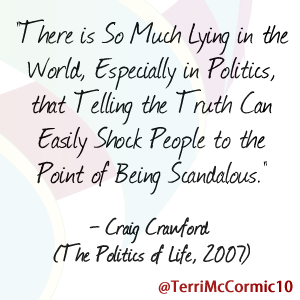 Campaigning is tough business. It takes someone with a lot of inner strength, a lot of community connections and a bit of money to make a solid run for office. Those of us who run “grassroots campaigns” understand just how difficult the road is for those who play by the rules. Yet there exists a breed of politician who does not follow the same road. This chapter is not about political corruption as an ending. Rather, it openly discusses old-style politics as a beginning, reveals the tactics of dirty campaigns and offers voters a strategy to determine a good candidate. It’s an appeal to all of us to do something about it!
Campaigning is tough business. It takes someone with a lot of inner strength, a lot of community connections and a bit of money to make a solid run for office. Those of us who run “grassroots campaigns” understand just how difficult the road is for those who play by the rules. Yet there exists a breed of politician who does not follow the same road. This chapter is not about political corruption as an ending. Rather, it openly discusses old-style politics as a beginning, reveals the tactics of dirty campaigns and offers voters a strategy to determine a good candidate. It’s an appeal to all of us to do something about it!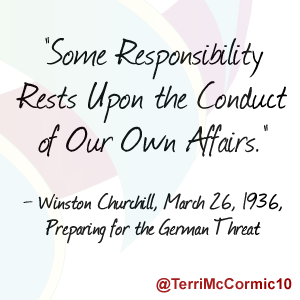 If you believe you are immune from Machiavellian influences in local politics, think twice. Whether you’re a voter or a candidate, Machiavellian influences are at all levels of politics.
If you believe you are immune from Machiavellian influences in local politics, think twice. Whether you’re a voter or a candidate, Machiavellian influences are at all levels of politics. American history has repeated itself with a revolving cycle of leadership between elitist and populist presidents and political leaders. As Jeffrey Bell notes, “Throughout history the presence of elites appears to be universal. Civilization is a society which generates elites.”15 In fact, throughout most of American history political equality was so insignificant that the debate between elitism and populism didn’t matter.
American history has repeated itself with a revolving cycle of leadership between elitist and populist presidents and political leaders. As Jeffrey Bell notes, “Throughout history the presence of elites appears to be universal. Civilization is a society which generates elites.”15 In fact, throughout most of American history political equality was so insignificant that the debate between elitism and populism didn’t matter.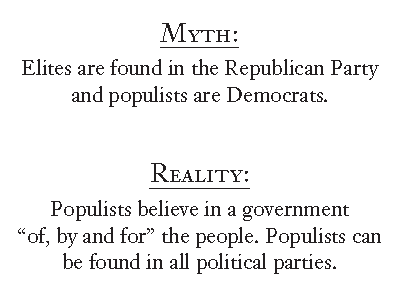 I was threatened to have my arms and legs broken and to get out of the race. I don’t know about you, but if elections don’t belong to the people in the Republican Party, the Party will be destroyed. I would like to think that the Republican Party is mature enough, big enough and smart enough that it actually knows that competition breeds excellence and the lack of competition breeds mediocrity.”
I was threatened to have my arms and legs broken and to get out of the race. I don’t know about you, but if elections don’t belong to the people in the Republican Party, the Party will be destroyed. I would like to think that the Republican Party is mature enough, big enough and smart enough that it actually knows that competition breeds excellence and the lack of competition breeds mediocrity.”